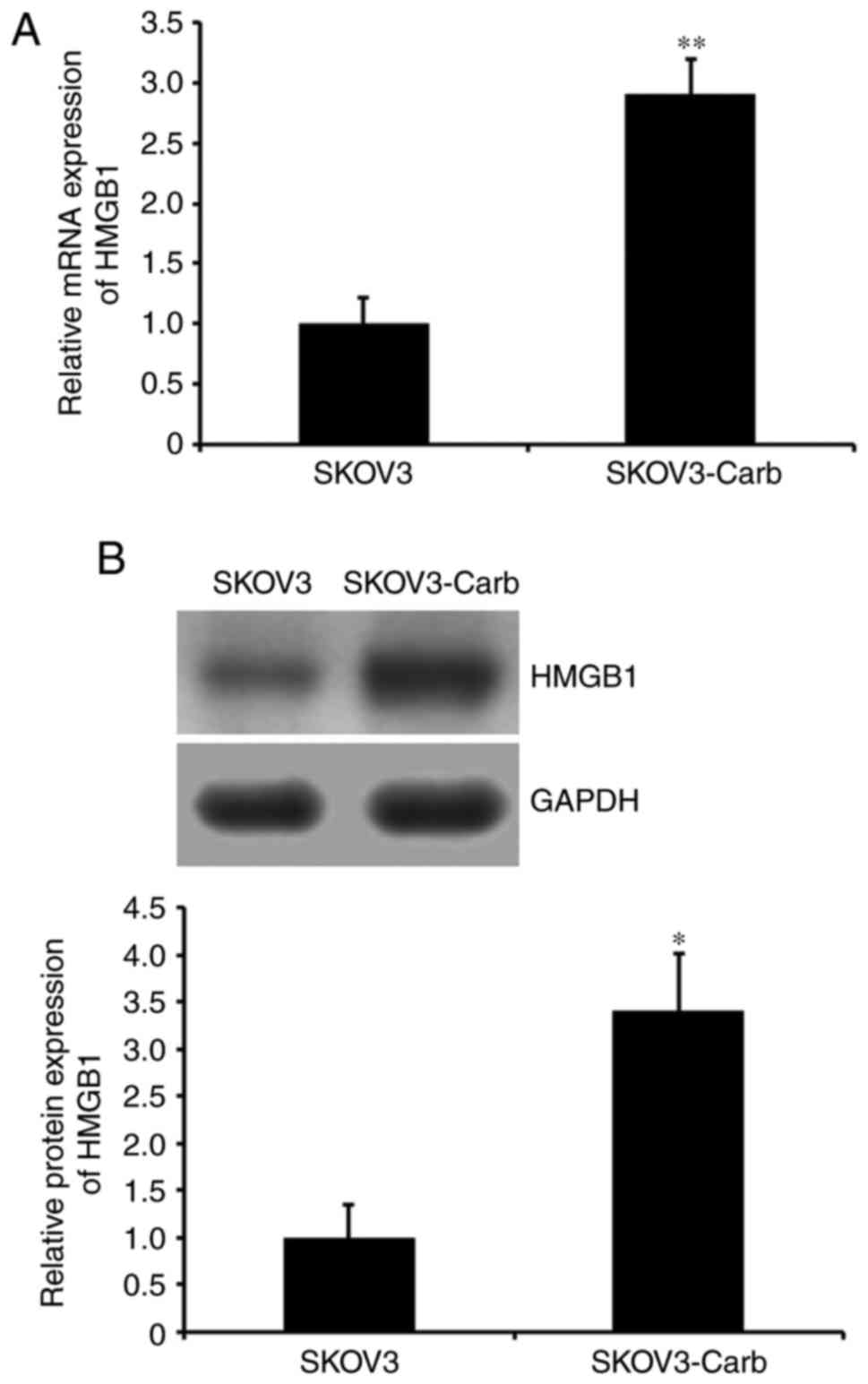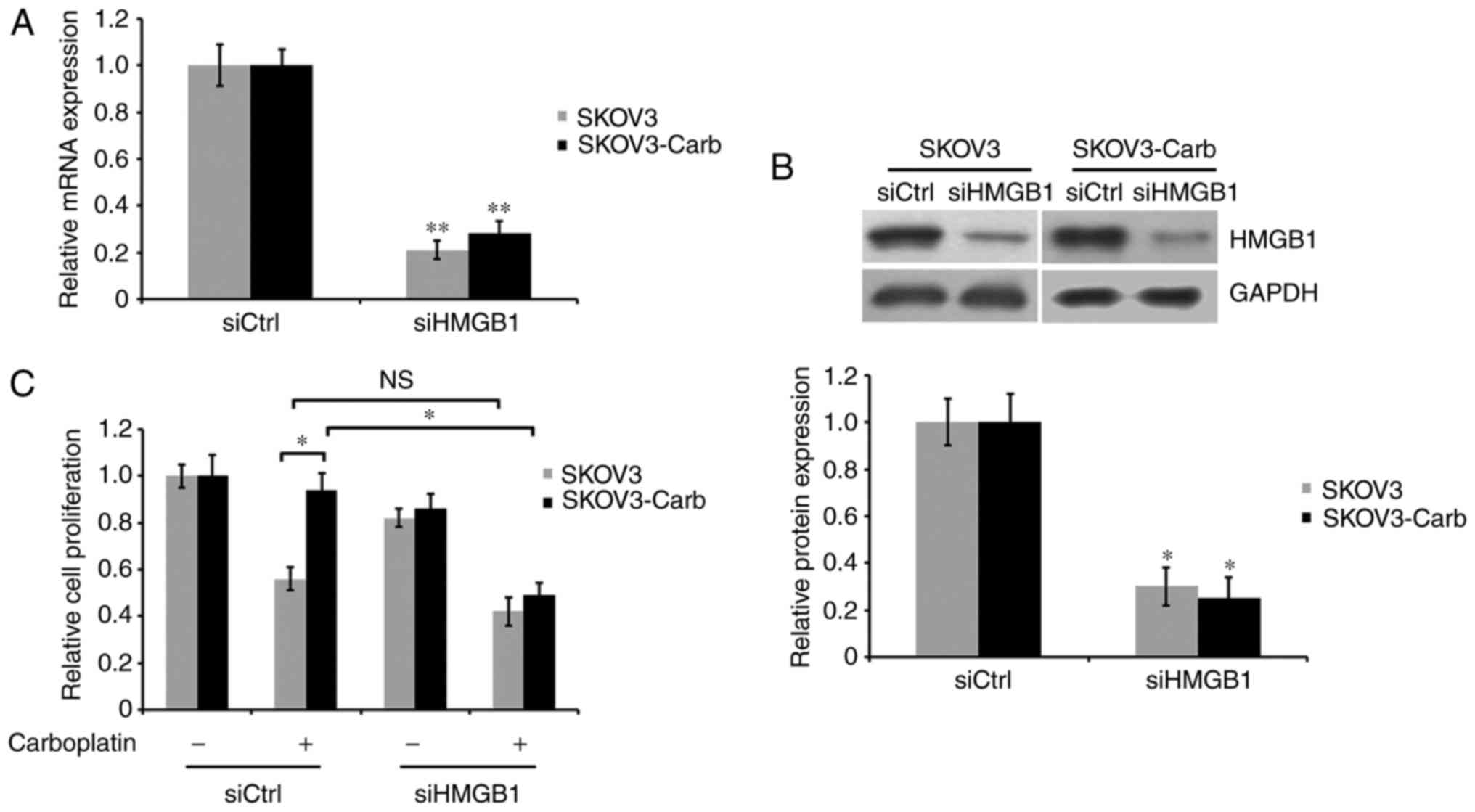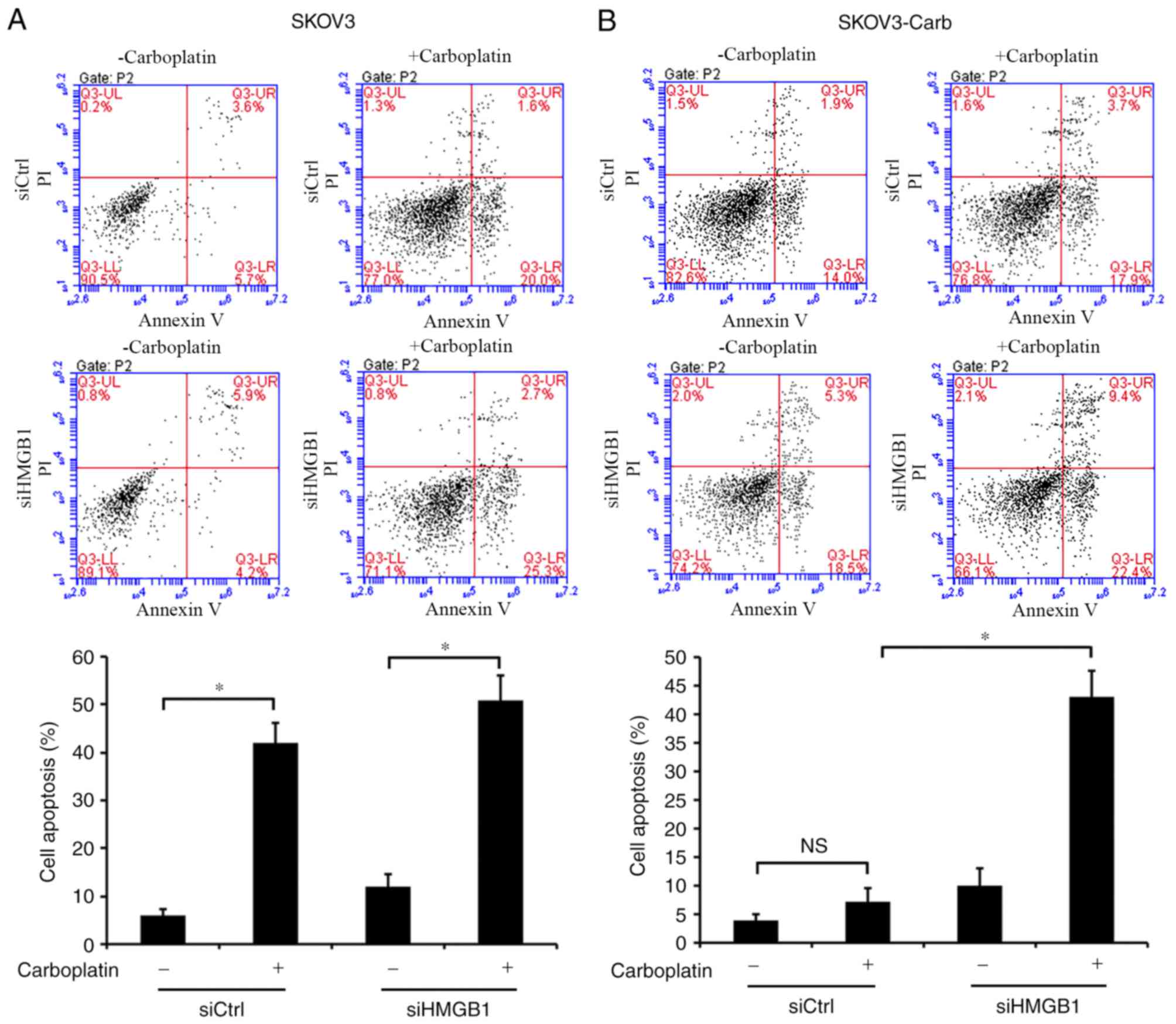|
1
|
Ferlay J, Shin HR, Bray F, Forman D,
Mathers C and Parkin DM: GLOBOCAN 2008 v1.2. Cancer incidence,
mortality and prevalence worldwideIARC CancerBase No. 10
(Internet). IARC Press; Lyon: 2010
|
|
2
|
Chen WQ, Zhang SW, Zou XN and Zhao P:
Cancer incidence and mortality in China, 2006. Chin J Cancer Res.
23:3–9. 2011. View Article : Google Scholar : PubMed/NCBI
|
|
3
|
du Bois A, Quinn M, Thigpen T, Vermorken
J, Avall-Lundqvist E, Bookman M, Bowtell D, Brady M, Casado A,
Cervantes A, et al: 2004 consensus statements on the management of
ovarian cancer: final document of the 3rd international gynecologic
cancer intergroup ovarian cancer consensus conference (GCIG OCCC
2004). Ann Oncol. 16:viii7–viii12. 2005. View Article : Google Scholar : PubMed/NCBI
|
|
4
|
Li R and Linghu H: Treatment progress in
epithelial ovarian cancer. J Int Obstet Gynecol. 37:277–280.
2010.(in Chinese).
|
|
5
|
Brouwer-Visser J, Lee J, McCullagh K,
Cossio MJ, Wang Y and Huang GS: Insulinlike growth factor 2
silencing restores taxol sensitivity in drug resistant ovarian
cancer. PLoS One. 9:e1001652014. View Article : Google Scholar : PubMed/NCBI
|
|
6
|
Wheate NJ, Walker S, Craig GE and Oun R:
The status of platinum anticancer drugs in the clinic and in
clinical trials. Dalton Trans. 39:8113–8127. 2010. View Article : Google Scholar : PubMed/NCBI
|
|
7
|
Apps MG, Choi EH and Wheate NJ: The
state-of-play and future of platinum drugs. Endocr Relat Cancer.
22:R219–R233. 2015.PubMed/NCBI
|
|
8
|
Wikipedia, the free encyclopedia:
Carboplatin. https://en.wikipedia.org/wiki/CarboplatinJune
2–2016
|
|
9
|
Taniguchi N, Yoshida K, Ito T, Tsuda M,
Mishima Y, Furumatsu T, Ronfani L, Abeyama K, Kawahara K, Komiya S,
et al: Stage-specific secretion of HMGB1 in cartilage regulates
endochondral ossification. Mol Cell Biol. 27:5650–5663. 2007.
View Article : Google Scholar : PubMed/NCBI
|
|
10
|
Lotze MT and Tracey KJ: High-mobility
group box 1 protein (HMGB1): Nuclear weapon in the immune arsenal.
Nat Rev Immunol. 5:331–342. 2005. View
Article : Google Scholar : PubMed/NCBI
|
|
11
|
Muller S, Scaffidi P, Degryse B, Bonaldi
T, Ronfani L, Agresti A, Beltrame M and Bianchi ME: New EMBO
members' review: the double life of HMGB1 chromatin protein:
architectural factor and extracellular signal. EMBO J.
20:4337–4340. 2001. View Article : Google Scholar : PubMed/NCBI
|
|
12
|
Tang D, Kang R, Zeh HJ III and Lotze MT:
High-mobility group box 1 and cancer. Biochim Biophys Acta.
1799:131–140. 2010. View Article : Google Scholar : PubMed/NCBI
|
|
13
|
Bell CW, Jiang W, Reich CF and Pisetsky
DS: The extracellular release of HMGB1 during apoptotic cell death.
Am J Physiol Cell Physiol. 291:C1318–C1325. 2006. View Article : Google Scholar : PubMed/NCBI
|
|
14
|
LeBlanc PM, Doggett TA, Choi J, Hancock
MA, Durocher Y, Frank F, Nagar B, Ferguson TA and Saleh M: An
immunogenic peptide in the a-box of HMGB1 protein reverses
apoptosis-induced tolerance through RAGE receptor. J Biol Chem.
289:7777–7786. 2014. View Article : Google Scholar : PubMed/NCBI
|
|
15
|
Lotze MT and DeMarco RA: Dealing with
death: HMGB1 as a novel target for cancer therapy. Curr Opin
Investig Drugs. 4:1405–1409. 2003.PubMed/NCBI
|
|
16
|
Park SY, Lee SW, Kim HY, Lee WS, Hong KW
and Kim CD: HMGB1 induces angiogenesis in rheumatoid arthritis via
HIF-1α activation. Eur J Immunol. 45:1216–1227. 2015. View Article : Google Scholar : PubMed/NCBI
|
|
17
|
Singh A, Feng Y, Mahato N, Li J, Wu C and
Gong J: Role of high-mobility group box 1 in patients with acute
obstructive suppurative cholangitis-induced sepsis. J Inflamm Res.
8:71–77. 2015. View Article : Google Scholar : PubMed/NCBI
|
|
18
|
Jang A, Liew H, Kim YM, Choi H, Kim S, Lee
SH, Ohshima T, Mikoshiba K and Suh YH: p35 deficiency accelerates
HMGB-1-mediated neuronal death in the early stages of an
Alzheimer's disease mouse model. Curr Alzheimer Res. 10:829–843.
2013. View Article : Google Scholar : PubMed/NCBI
|
|
19
|
Park S, Yoon SJ, Tae HJ and Shim CY: RAGE
and cardiovascular disease. Front Biosci (Landmark Ed). 16:486–497.
2011. View Article : Google Scholar : PubMed/NCBI
|
|
20
|
Meyer A, Staratschek-Jox A, Springwald A,
Wenk H, Wolf J, Wickenhauser C and Bullerdiek J: Non-Hodgkin
lymphoma expressing high levels of the danger-signalling protein
HMGB1. Leuk Lymphoma. 49:1184–1189. 2008. View Article : Google Scholar : PubMed/NCBI
|
|
21
|
Brezniceanu ML, Volp K, Bosser S, Solbach
C, Lichter P, Joos S and Zornig M: HMGB1 inhibits cell death in
yeast and mammalian cells and is abundantly expressed in human
breast carcinoma. FASEB J. 17:1295–1297. 2003. View Article : Google Scholar : PubMed/NCBI
|
|
22
|
Feng A, Tu Z and Yin B: The effect of
HMGB1 on the clinicopathological and prognostic features of
non-small cell lung cancer. Oncotarget. 7:20507–20519. 2016.
View Article : Google Scholar : PubMed/NCBI
|
|
23
|
Cheng P, Dai W, Wang F, Lu J, Shen M, Chen
K, Li J, Zhang Y, Wang C, Yang J, et al: Ethyl pyruvate inhibits
proliferation and induces apoptosis of hepatocellular carcinoma via
regulation of the HMGB1-RAGE, and AKT pathways. Biochem Biophys Res
Commun. 443:1162–1168. 2014. View Article : Google Scholar : PubMed/NCBI
|
|
24
|
Akaike H, Kono K, Sugai H, Takahashi A,
Mimura K, Kawaguchi Y and Fujii H: Expression of high mobility
group box chromosomal protein-1 (HMGB-1) in gastric cancer.
Anticancer Res. 27:449–457. 2007.PubMed/NCBI
|
|
25
|
Kang HJ, Lee H, Choi HJ, Youn JH, Shin JS,
Ahn YH, Yoo JS, Paik YK and Kim H: Non-histone nuclear factor HMGB1
is phosphorylated and secreted in colon cancers. Lab Invest.
89:948–959. 2009. View Article : Google Scholar : PubMed/NCBI
|
|
26
|
Gnanasekar M, Kalyanasundaram R, Zheng G,
Chen A, Bosland MC and Kajdacsy-Balla A: HMGB1: A promising
therapeutic target for prostate cancer. Prostate Cancer.
2013:1571032013. View Article : Google Scholar : PubMed/NCBI
|
|
27
|
Chen J, Liu X, Zhang J and Zhao Y:
Targeting HMGB1 inhibits ovarian cancer growth and metastasis by
lentivirus-mediated RNA interference. J Cell Physiol.
227:3629–3638. 2012. View Article : Google Scholar : PubMed/NCBI
|
|
28
|
Guo ZS, Liu Z, Bartlett DL, Tang D and
Lotze MT: Life after death: targeting high mobility group box 1 in
emergent cancer therapies. Am J Cancer Res. 3:1–20. 2013.PubMed/NCBI
|
|
29
|
Machado L, Moseley P, Moss R, Nolan C,
Rampage J, Chan S and Durrant LG: High-mobility group protein 1
(HMGB1) is an independent predictor of poor survival in ovarian
cancerProceedings of the National Cancer Research Institute (NCRI)
Cancer Conference. Liverpool, UK: 2014
|
|
30
|
Zhi H, Ma HY and Chen XL: The changes and
clinical significance of serum levels of HMGB1, VEGF before and
after operation in patients with ovarian carcinoma. Hebei Med J.
36:1297–1299. 2014.(In Chinese).
|
|
31
|
Zhang R, Li Y, Wang Z, Chen L, Dong X and
Nie X: Interference with HMGB1 increases the sensitivity to
chemotherapy drugs by inhibiting HMGB1-mediated cell autophagy and
inducing cell apoptosis. Tumour Biol. 36:8585–8592. 2015.
View Article : Google Scholar : PubMed/NCBI
|
|
32
|
Slack JL, Bi W, Livak KJ, Beaubier N, Yu
M, Clark M, Kim SH, Gallagher RE and Willman CL: Pre-clinical
validation of a novel, highly sensitive assay to detect
PML-RARalpha mRNA using real-time reverse-transcription polymerase
chain reaction. J Mol Diagn. 3:141–149. 2001. View Article : Google Scholar : PubMed/NCBI
|
|
33
|
Harding M: Ovarian cancer. https://patient.info/doctor/ovarian-cancer-proDecember
2–2016
|
|
34
|
Szakacs G, Paterson JK, Ludwig JA,
Booth-Genthe C and Gottesman MM: Targeting multidrug resistance in
cancer. Nat Rev Drug Discov. 5:219–234. 2006. View Article : Google Scholar : PubMed/NCBI
|
|
35
|
Germann UA and Chambers TC: Molecular
analysis of the multidrug transporter, P-glycoprotein.
Cytotechnology. 27:31–60. 1998. View Article : Google Scholar : PubMed/NCBI
|
|
36
|
Xu Y, Zhi F, Xu G, Tang X, Lu S, Wu J and
Hu Y: Overcoming multidrug resistance in vitro and in vivo by a
novel P-glycoprotein inhibitor 1416. Biosci Rep. 32:559–566. 2012.
View Article : Google Scholar : PubMed/NCBI
|
|
37
|
Sun KK, Ji C, Li X, Zhang L, Deng J, Zhong
N and Wu XY: Overexpression of high mobility group protein B1
correlates with the proliferation and metastasis of lung
adenocarcinoma cells. Mol Med Rep. 7:1678–1782. 2013. View Article : Google Scholar : PubMed/NCBI
|
|
38
|
Ni P, Zhang Y, Liu Y, Lin X, Su X, Lu H,
Shen H, Xu W, Xu H and Su Z: HMGB1 silence could promote MCF-7 cell
apoptosis and inhibit invasion and metastasis. Int J Clin Exp
Pathol. 8:15940–15946. 2015.PubMed/NCBI
|
|
39
|
Li Z, Wang H, Song B, Sun Y, Xu Z and Han
J: Silencing HMGB1 expression by lentivirus-mediated small
interfering RNA (siRNA) inhibits the proliferation and invasion of
colorectal cancer LoVo cells in vitro and in vivo. Zhonghua Zhong
Liu Za Zhi. 37:664–670. 2015.(in Chinese). PubMed/NCBI
|


















